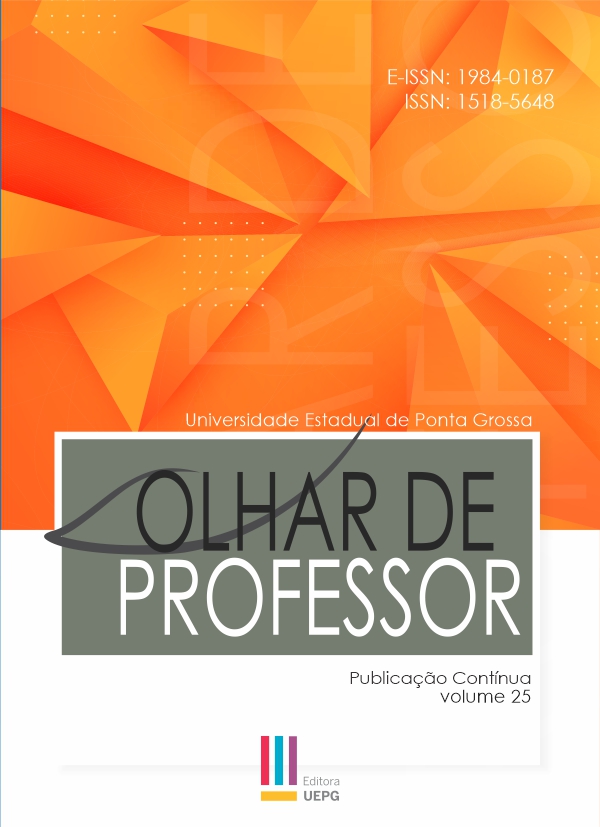From education 1.0 to education 3.0: challenges for teaching practice in the 21st Century
Main Article Content
Abstract
This article aims to analyze the perceptions of undergraduate students about the use of online platforms as a collaborative learning environment and its relevance to the formative processes in the molds of Education 3.0. This is an excerpt from a Master's thesis in Education in the area of technology and education, which had as its research practice the use of social networks as a learning environment, developed in the Portuguese Instrumental discipline, of the undergraduate course in Vernacular Letters of a federal university. The research, with a qualitative approach, had as subjects the seventeen students of the discipline and was carried out through the Research-formation method, using participant observation, the questionnaire and the semi-structured interview as instruments of data collection, the latter carried out only with graduating students in the class. The data showed the need to reflect on the practices necessary for teaching today, highlighting, based on the testimonies of the participants, the absence in the initial formation of more dynamic activities and practices, in which there is effective use of technologies, which culminates in insecurity about future challenges. If the student is in the process of training, regardless of the chosen professional destinations, it is necessary to link teaching to the practices that take place in the computerized and interconnected society in which we live.
Downloads
Article Details
Authors who publish in this journal agree with the following terms:
a) Authors keep the copyrights and concede the right of its first publication to the magazine. The work piece must be simultaneously licensed on the Creative Commons Attribution License which allows the paper sharing, and preserves both the author identity and the right of first publication to this magazine.
b) Authors are authorized to assume additional contracts separately, to not-exclusively distribution of the paper version published in this magazine (e.g.: publish in institutional repository or as a book chapter), with the author identity recognition and its first publication in this magazine.
c) Authors are permitted and stimulated to publish and distribute their papers online (e.g.: in institutional repository or on their personal webpage), considering it can generate productive alterations, as well as increase the impact and the quotations of the published paper.
d) This journal provides public access to all its content, as this allows a greater visibility and reach of published articles and reviews. For more information on this approach, visit the Public Knowledge Project, a project that developed this system to improve the academic and public quality of the research, distributing OJS as well as other software to support the publication system of public access to academic sources.
e) The names and e-mail addresses on this site will be used exclusively for the purposes of the journal and are not available for other purposes.

This work is licensed under a Creative Commons Attribution 4.0 International License.
References
ALLAN, L. M. Educação 3.0: estamos prontos? Editora Abril: Educar para crescer. Publicação on-line,s/p., 08 ago. 2012. Disponível em: https://www.pautaonline.com.br/blog/educacao-30-estamos-prontos/93. Acesso em: 02 mar 2014.
ANDRÉ, M. E. D. A. Etnografia da prática escolar. Campinas: Papirus, 1995.
FAVA, R. Educação 3.0: como ensinar estudantes com culturas tão diferentes. 2ª Ed. Cuiabá: Carlini e Caniato Editorial, 2011.
GALLANA, L. M. R. Facebook: um espaço de colaboração para a troca de experiências com uso de tecnologias em sala de aula. 2013. Dissertação (Mestrado em Educação) - Universidade Estadual de Campinas, São Paulo, 2013. Disponível em:
http://repositorio.unicamp.br/jspui/handle/REPOSIP/250857. Acesso em: 13 mar 2014.
IMBERNÓN, F. Formação docente e profissional: formar-se para a mudança e a incerteza. 6ª ed. São Paulo: Cortez, 2006.
LENGEL, J. Educação 3.0. Estadão, on-line, 07 nov. 2012. Caderno Educação. Disponível em: http://educacao.estadao.com.br/noticias/geral,artigo-educacao-30,956582. Acesso em 14 jul. 2014.
LIBÂNEO, J. C. Adeus professor, adeus professora?: novas exigências educacionais e profissão docente. São Paulo: Cortez, 2011.
LONGAREZI, A. M.; SILVA, J. L. Pesquisa-formação: Um olhar para sua constituição conceitual e política. Revista Contrapontos, v. 13, n. 3, p. 214-225, set./dez., 2013. Disponível em: https://siaiap32.univali.br/seer/index.php/rc/article/view/4390. Acesso em: 20 fev. 2015. DOI: https://doi.org/10.14210/contrapontos.v13n3.p214-225
LONGAREZI, A. M.; SILVA, J. L. Interface entre pesquisa e formação de professores: delimitando o conceito de pesquisa-formação. In: VIII Congresso Nacional de Educação – EDUCERE, 2008, Curitiba. Anais [...] Curitiba, Paraná, 2008. Disponível em: https://educere.pucpr.br/p8/anais.html. Acesso em: 13 dez 2014.
NÓVOA, A. Prefácio. In: JOSSO, M.C. Experiências de vida e formação. São Paulo: Cortez Editora, 2004. Página 7-12.
NUNES, J. B. C.; NUNES, A. I. B. L. Formação De professores na era de tecnologias digitais: desafios para a educação neste milênio. In: SCHNEIDER, H. N.; LACKS, S. (org.). Educação no século XXI: desafios e perspectivas. São Cristóvão: Editora UFS, 2012. Página 117- 144.
PALLOFF, R. M.; PRATT, K. O aluno virtual: um guia para trabalhar com estudantes on-line. Trad. Vinícius Figueira. Porto Alegre: Artmed, 2004.
PRENSKY, M.: Digital Natives Digital Immigrants. In: PRENSKY, Marc. On the Horizon. NCB University Press, v.9, n.5, oct., 2001. Disponível em: http://www.marcprensky.com/writing/Prensky%20-%20Digital%20Natives,%20Digital%20Immigrants%20-%20Part1.pdf. Acesso em 13 dez 2014. DOI: https://doi.org/10.1108/10748120110424816
SANTAELLA, L. Culturas e artes do pós-humano: da cultura das mídias à cibercultura. São Paulo: Paulus, 2003.
SANTOS, I. P.; BLÁZQUEZ, F. Incorporação das novas tecnologias no ensino superior. Goiânia: R&F, 2005.
SOUZA, A. A. N. O Facebook como ambiente de aprendizagem: uma análise da praxis presencial mediada pelo conectivismo pedagógico. 2015. 187 f. Dissertação (Mestrado em Educação) - Universidade Federal de Sergipe, São Cristóvão, 2015.
STAHL, M. M. Formação de professores para uso das novas tecnologias de comunicação e informação. In: CANDAU, Vera Maria (org.). Magistério: construção cotidiana. Petrópolis, RJ: Vozes, 1997, p. 292-317.
TAPSCOTT, D. A hora da geração digital: como os jovens que cresceram usando a internet estão mudando tudo, das empresas ao governo. Trad. Marcello Lino. Rio de Janeiro: Agir negócios, 2010.
VYGOTSKY, L. S. Pensamento e Linguagem. 4ª ed. São Paulo: Martins Fontes, 2008.





